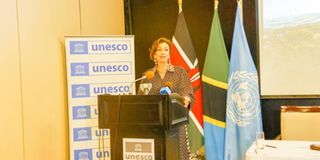Unesco’s Sh21 billion water project to benefit millions in East Africa

Unesco Director-General Audrey Azoulay expressed her appreciation to the Presidents of Tanzania and Kenya for their efforts in protecting this critical global resource. PHOTO | COURTESY
What you need to know:
- The initiative seeks to conserve 400 acres of the Mount Kilimanjaro forest, a critical water source for over two million people.
Dar es Salaam. The United Nations Educational, Scientific and Cultural Organization (Unesco) has announced an $8 million (Sh21 billion) project aimed at improving groundwater management in Tanzania and Kenya.
The initiative seeks to conserve 400 acres of the Mount Kilimanjaro forest, a critical water source for over two million people.
Speaking in Dar es Salaam, Water Minister Jumaa Aweso emphasized that international cooperation in water resource management is essential to achieving the United Nations Sustainable Development Goals (SDGs), particularly Goal 6, which focuses on clean water and sanitation.
He highlighted the Kilimanjaro water project, which covers the Rombo and Hai districts, as a successful example of collaboration in water conservation.
“I am pleased to announce that the partnership between Tanzania and Unesco has yielded positive results, including the implementation of this $8 million international groundwater project. This is a major step forward, and we are grateful for the strategic support towards making this project a reality,” Mr Aweso said.
The minister also shared plans to strengthen collaboration with Unesco in water resource management, noting that the UN agency oversees 22 international water sources.
“This is the right time for Unesco and Tanzania to initiate more joint projects to mobilize resources for investment and development in the water sector, ensuring sustainable access to this crucial resource for national development,” he added.
Additionally, Mr Aweso mentioned that during the United Nations Water Conference in New York, he engaged with Unesco Director-General Audrey Azoulay to discuss key areas of collaboration, including institutional capacity building for groundwater resource assessment and management, strengthening development cooperation, and mobilizing resources for water and climate change initiatives.
Unesco Director-General Audrey Azoulay expressed her appreciation to the Presidents of Tanzania and Kenya for their efforts in protecting this critical global resource.
“Water is life, and women play a key role in conserving this resource. Kilimanjaro is not only a global natural icon but also a critical water source for communities in Tanzania and Kenya,” she said.
Recognizing the impact of climate change, Unesco also announced an expedition to Mount Kilimanjaro in August this year. The expedition will involve 30 climbers, including young Africans, to raise global awareness of the melting glaciers and its effects on mountain communities.
Tanzania’s Minister for Education, Science, and Technology, Adolf Mkenda, noted that the government has been working tirelessly to ensure access to clean and safe water for the people of Rombo.
“Funds have already been allocated to extract water from Lake Chala, but we have not yet met 100 percent of the water demand, especially for drinking and irrigation purposes,” he said.
Prof Mkenda further emphasized that the project provides a significant opportunity to improve the lives of people in Rombo and Hai districts, as well as neighbouring communities in Kenya.
Kenya’s Water and Irrigation Minister Eric Mugaa affirmed his government’s commitment to ensuring access to clean, safe, and affordable water for all.
However, he acknowledged that challenges such as climate change, rapid urbanization, and competing water needs require innovative and collaborative solutions.
"The Kenyan government is committed to ensuring access to water and sanitation for all by 2030, in line with Sustainable Development Goal 6 and the constitutional requirements on water and sanitation," Mr Mugaa said.
As part of its efforts, the Kenyan government has completed groundwater resource mapping in Tana River, Wajir, and Marsabit counties, with ongoing work in Mandera County.




